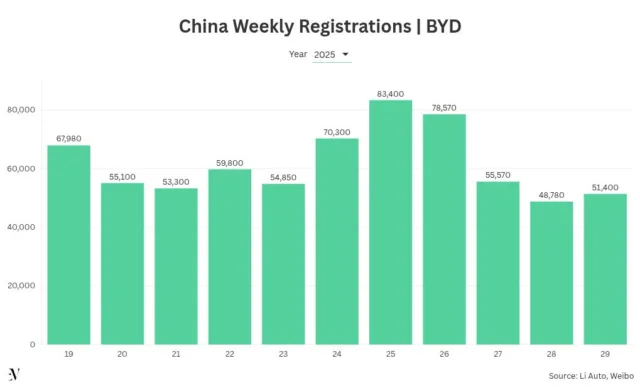Chinese giant BYD sold 51,400 vehicles in its domestic market last week, according to insurance registration data released on Tuesday.
The figures registered between July 14 and 20 were up by 5.3% from the 48,800 units sold in the second week of July — its lowest result since the first week of the second quarter, three months ago.
Year to date, the Shenzhen-based company has registered over 1.5 million vehicles in China.
BYD remains the top-selling brand in the country, not only among new energy vehicle (NEV) brands but across all powertrains, with a lineup that includes both hybrid and fully electric models.
The Group sold 377,628 passenger vehicles in June across its four brands — BYD, Denza, Fang Cheng Bao and Yangwang. Figures came in 11% higher from a year earlier, helping to push first-half volumes to 2.1 million.
The company needs to hand over 2.4 million vehicles in the second half to hit its annual target of 5.5 million deliveries.
BYD’s luxury brand Yangwang will be expanding to Europe, becoming the first Chinese automaker to enter the top-tier luxury segment in the continent.
Last month, the luxury brand registered 205 vehicles, from which 64 were U8 SUVs, 64 were U9 supercars, its most expensive model, and 132 were its U7 sedans.
The information was confirmed on Monday by executive Vice President Stella Li, who reiterated the launch of the high-end Denza brand in the old continent “early next year.”
BYD will launch its Sealion 06 SUV on Thursday, July 23. The model, which will be available both as a plug-in hybrid (PHEV) and a pure electric vehicle (BEV), was revealed in a catalogue by China’s MIIT in April.
The company announced on Monday that it has partnered with the top European football club Inter Milan.
It will become its global automotive partner for the next three seasons.
On Tuesday, Reuters reported that BYD is postponing the start of mass production in its first European plant, in Hungary — where it also established its European headquarters.
The company will now start production in 2026, after previously targeting the end of 2025 as the beginning of operations.
It expects to produce “tens of thousands” of vehicles initially, in a plant where BYD aims to produce 200,000 to 300,000 vehicles annually.









